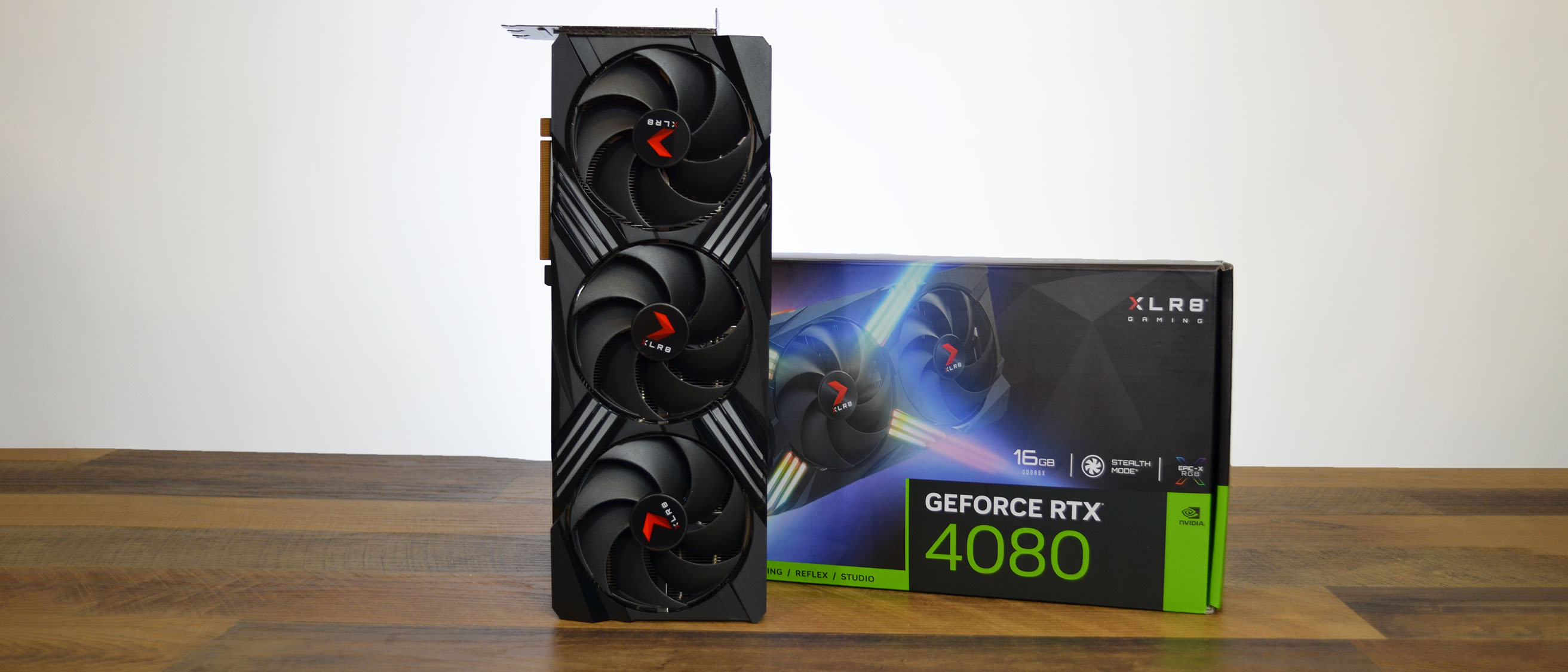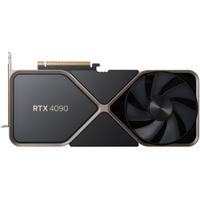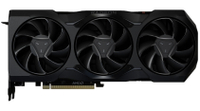TechRadar Verdict
The PNY GeForce RTX 4080 XLR8 OC is a hard card to recommend, since no RTX 4080 is really worth recommending when the RTX 4090 is right there, and the RTX 4070 Ti and RX 7900 XTX offer a better value. But if you are going for the RTX 4080, make it the PNY RTX 4080 XLR8 OC, at least.
Pros
- +
Cheaper than MSRP
- +
Overclocked
- +
Better memory performance
Cons
- -
Still too expensive
- -
Chonky af
Why you can trust TechRadar
PNY GeForce RTX 4080 XLR8 OC: Two-minute review
The PNY GeForce RTX 4080 XLR8 has a lot of things going for it, but one of those is not that it's something other than an RTX 4080.
In my Nvidia GeForce RTX 4080 review, I found that the Founders Edition card had excellent performance, and the same is true with PNY's XLR8 OC version. In fact, its performance is slightly better, on average, than the base reference model thanks to this card being overclocked and having some third-party extras that the Nvidia reference card lacks.
While the underlying GPU architecture and memory between the two are the same — so you get the same number of SMs, RT cores, Tensor cores, and the like, as well as 16GB GDDR6X VRAM — you do get faster clock speeds with the XLR8 OC card. The base clock speed is the same, but the boost clock is about 2% faster, while the memory clock speed is about 3% faster.
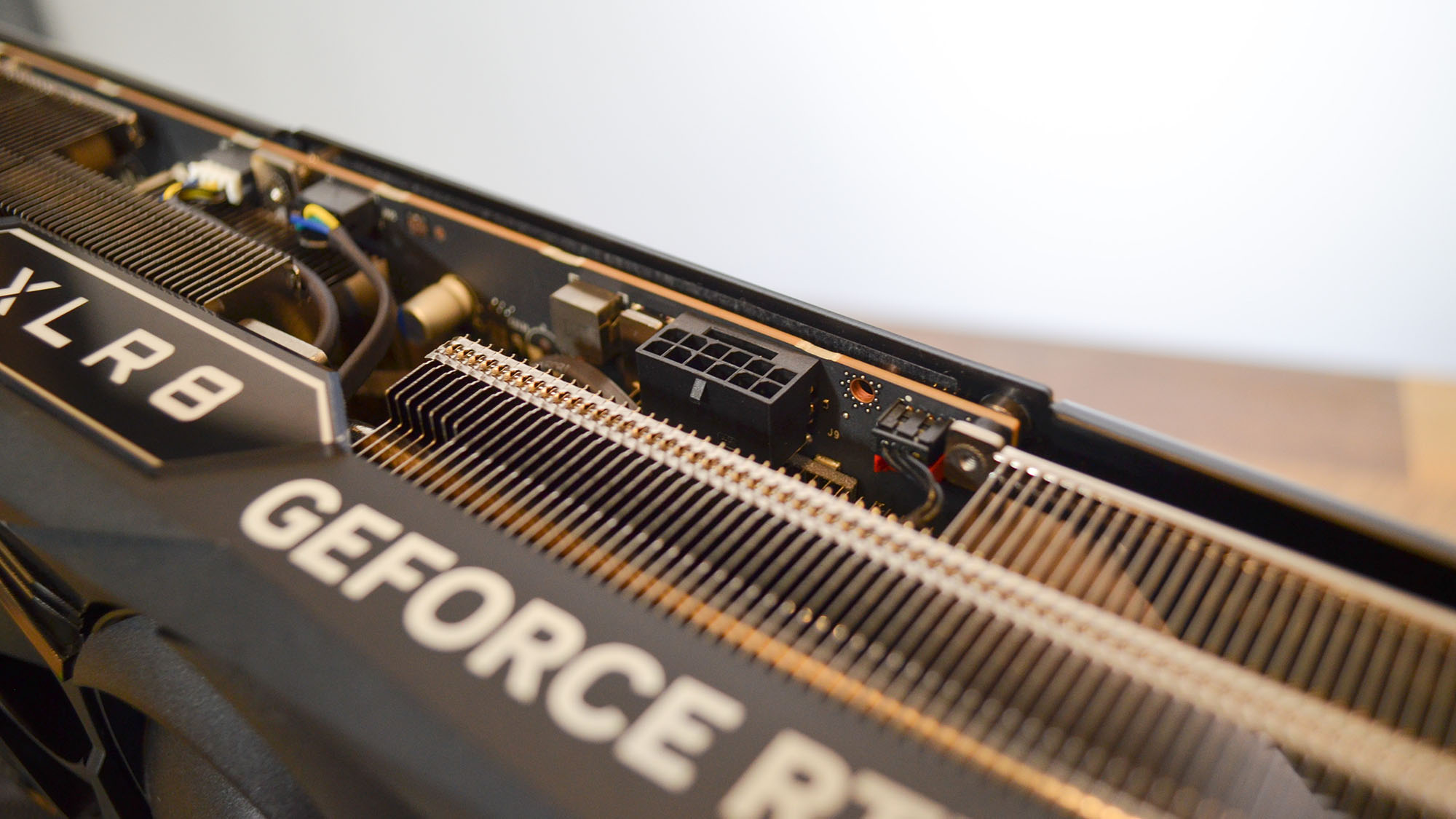
Toss in some RGB lighting (if that's your thing) and a triple-fan cooling solution with a larger heat sink, and you have a card that will throttle less, have customization options that many PC gamers will love, and everywhere I've seen it, you can get it for less than Nvidia's frankly outrageous $1,199 (about £960, AU$1,740) MSRP.
I've seen the PNY RTX 4080 XLR8 OC retailing for $1,189 (about £950 / AU$1,725) on PNY's website, and found it selling for even less on most retail sites I checked.
This isn't the biggest savings, but you do get some extras here that the reference card lacks and sales make this card a lot more accessible than the RTX 4080 was at launch. If you are going to pick up the PNY RTX 4080 XLR8 OC though, make sure you are actually buying the OC version of the card since PNY also makes a non-OC XLR8 version for slightly less, and they are otherwise identical and easily confused online.
On the design front, the RTX 4080 XLR8 OC looks much more like a gamers' RTX 4080 than Nvidia's reference design, so if you're looking to outfit your gaming PC with a new GPU and you want it to match the look of your other addressable RGB components, this will do that much better than Nvidia's reference card will.
The RTX 4080 XLR8 OC sticks with the same 3-to-1 8-pin-to-12VHPWR cable adapter that its other cards have gone with since Nvidia Ampere launched in 2020, so if you don't have an ATX 3.0 PSU with a dedicated 12VHPWR cable, cable management with this card will be challenging, though less so than with the laughably tentacled RTX 4090.
Cable management will also be a concern here as the RTX 4080 XLR8 OC is larger than the RTX 4080 reference card, which is already a monster GPU. At 13-inches long, this card is just over 7% longer than the reference card, and about 17% thicker, taking up 3.5 slots. It has the same display output as the base RTX 4080, so three DisplayPort 1.4a ports and an HDMI 2.1 port, with no USB Type-C output.
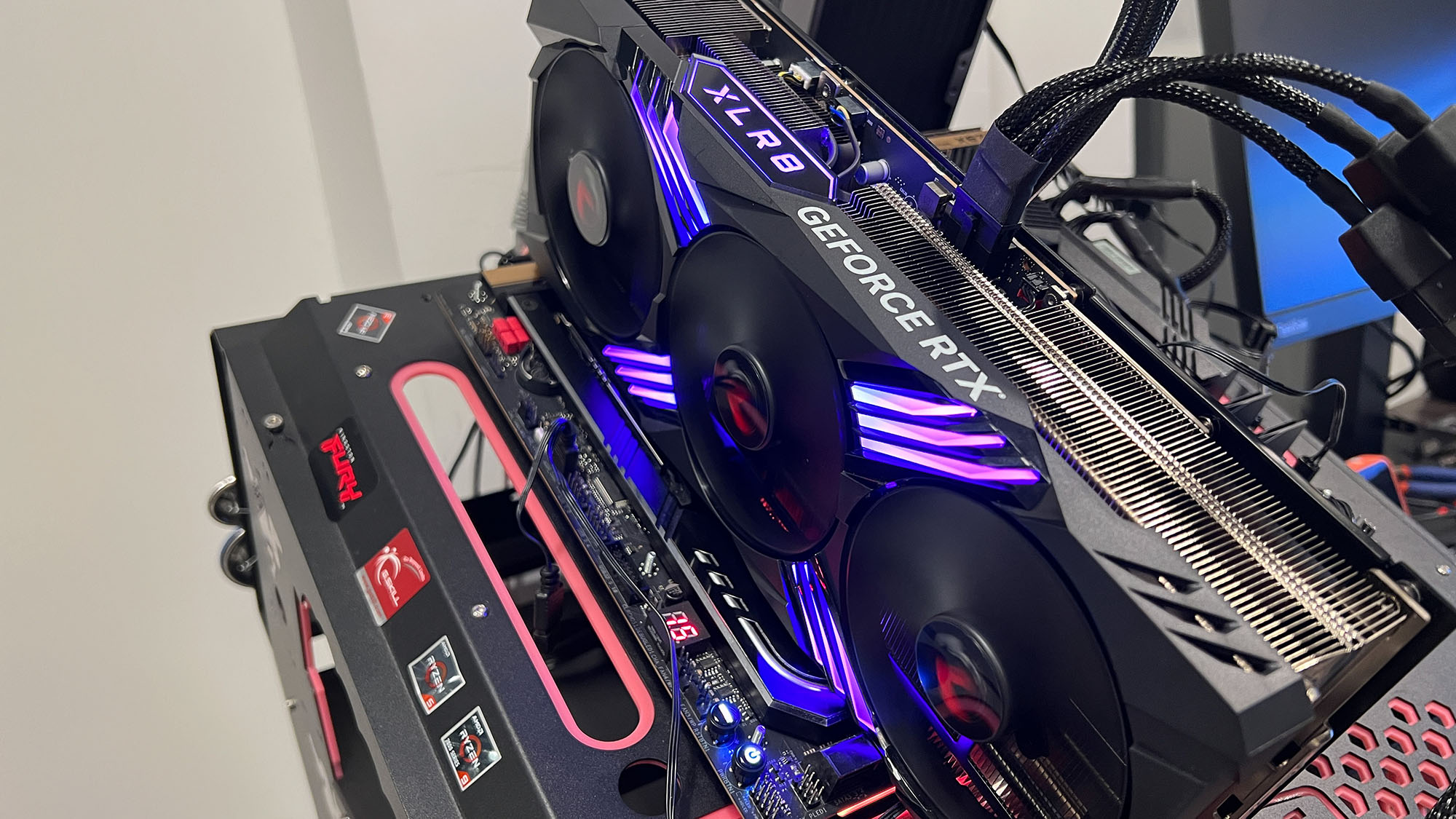
If you want to know more about the kind of performance the RTX 4080 is capable of, I would refer you back to the original RTX 4080 review, since the effective difference isn't enough to thoroughly rehash here.
On that note, given the effectively identical performance of the base Nvidia RTX 4080 and the PNY RTX 4080 XLR8 OC, the PNY RTX 4080 XLR8 OC suffers from the same problem as the base reference card, which is that you can get the best AMD graphics card on the market for cheaper.
In my AMD Radeon RX 7900 XTX review, I found that the 7900 XTX effectively outperformed the RTX 4080 (with the exception of some ray-tracing workloads and overall creative performance), and did so while costing roughly 16% less than Nvidia's MSRP, making it the best graphics card for gamers overall.
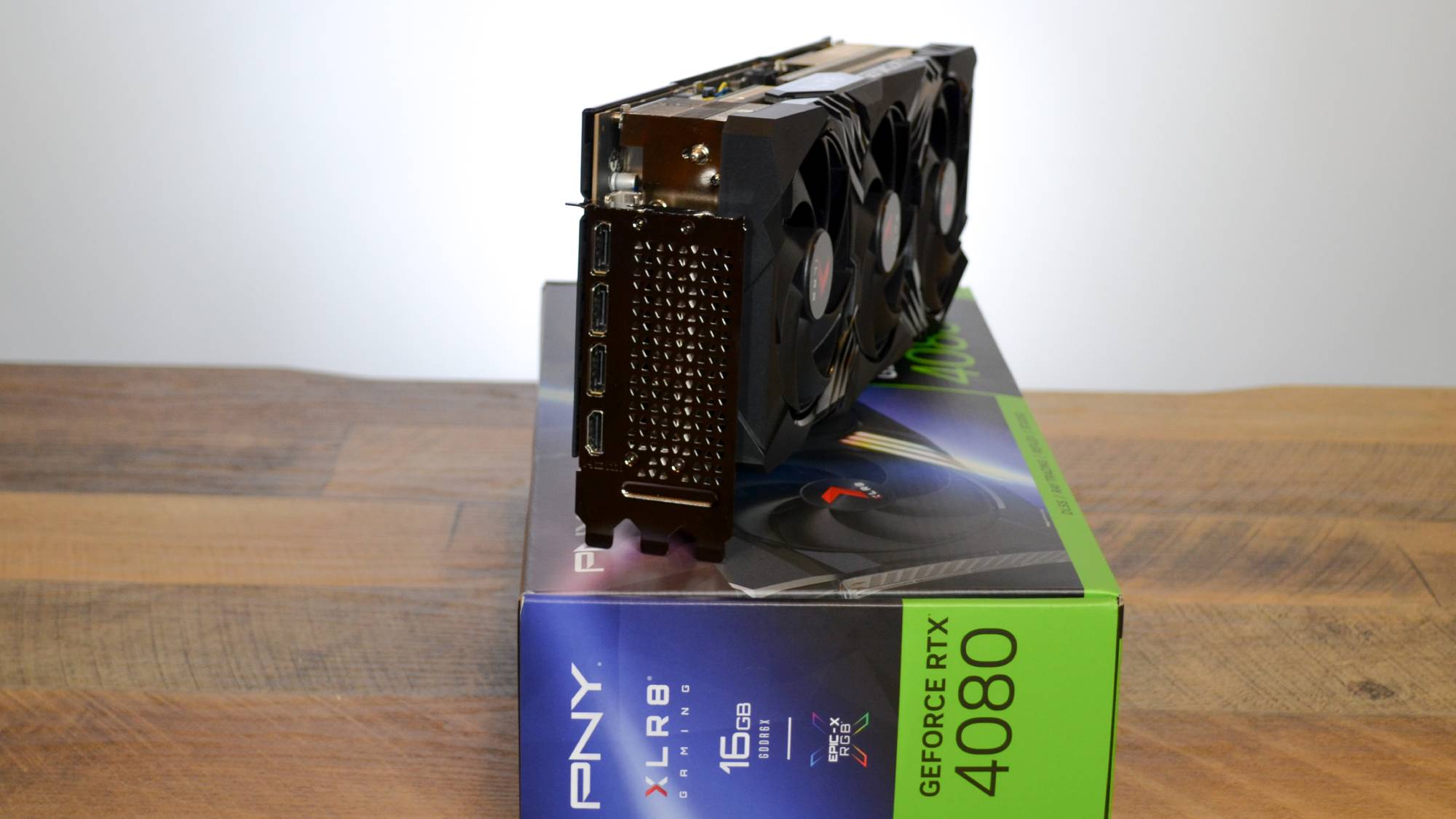
You can get the PNY RTX 4080 XLR8 OC for less than Nvidia's MSRP, but it's still going to be much more expensive than AMD's flagship GPU, so unless you need to do rendering work in Lumion or Blender, the RX 7900 XTX is going to be a much better bet for just about everyone, and those who must have an Nvidia RTX card, the RTX 4070 Ti offers a far better value and creatives should be going to the RTX 4090 anyway.
All things considered, the problems with the PNY RTX 4080 XLR8 OC are hard to get around, but only because it's an RTX 4080, and there isn't much PNY can do about that. That said, if you absolutely cannot spend the money to get the RTX 4090 and you need an RTX card, rather than the RX 7900 XTX, then the PNY RTX 4080 XLR8 OC at least offers you a better proposition than Nvidia's base model, and it does so while mitigating the price somewhat.
So, if it's gotta be an RTX 4080 for whatever reason, do yourself a favor and make it the PNY GeForce RTX 4080 XLR8 OC. At least that way you'll get something extra thrown in to help choke down the price you're going to have to pay.
PNY GeForce RTX 4080 XLR8: Specs
While the base specs of the RTX 4080 Founders Edition and the PNY RTX 4080 XLR8 OC are essentially the same, there are a few differences worth noting beyond the differences in aesthetic design.
| Header Cell - Column 0 | PNY GeForce RTX 4080 XLR8 | Nvidia GeForce RTX 4080 Founders Edition | Difference |
|---|---|---|---|
| Price (MSRP) | $1,189 (about £950 / AU$1,725) | $1,199 (about £960, AU$1,740) | -0.83% |
| SM Count | 76 | 76 | 0.0% |
| CUDA Cores | 9,728 | 9,728 | 0.0% |
| RT Cores | 76 | 76 | 0.0% |
| Tensor Cores | 304 | 304 | 0.0% |
| Base Clock | 2,205MHz | 2,205MHz | 0.0% |
| Boost Clock | 2,550MHz | 2,505MHz | 1.79% |
| Memory Clock | 1,437.5MHz | 1,400MHz | 2.67% |
| Effective Memory Speed | 23 Gbps | 22.4 Gbps | 2.67% |
| Memory Bandwidth | 736 GB/s | 716.8 GB/s | 2.67% |
| Length | 13 ins | 332 mm | 12.2 ins | 310 mm | 7.04% |
| Height | 5.4 ins | 137 mm | 5.5 ins | 140 mm | -2.0% |
| Width | 2.8 ins | 71 mm | 2.4 ins | 61 mm | 16.67% |
| Cooling | Triple-fan | Double-fan | 50% |
PNY GeForce RTX 4080 XLR8: Price & availability
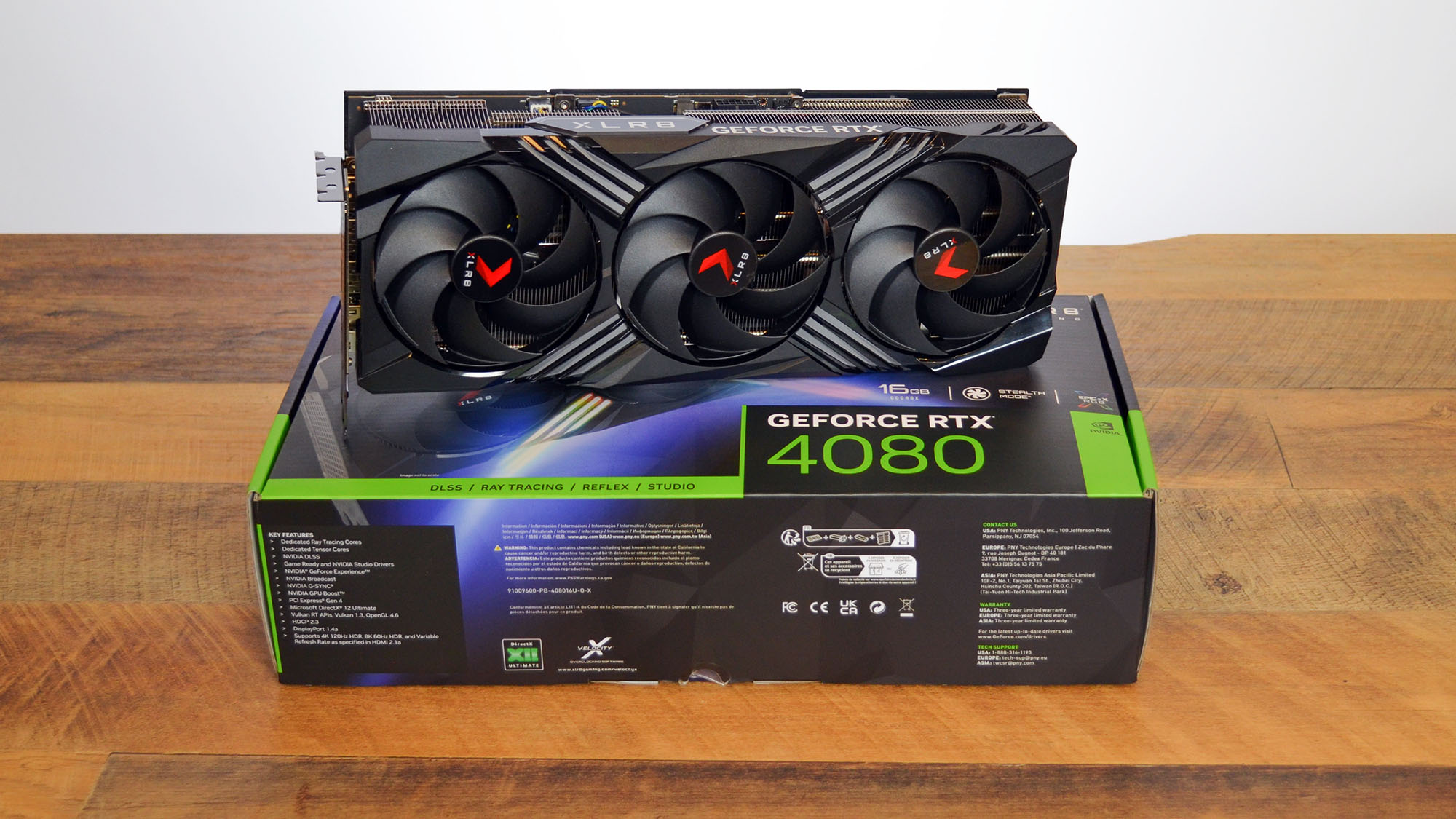
- How much does it cost? $1,189 (about £950 / AU$1,725)
- When is it available? Available now
- Where can you get it? Available in the US, UK, and Australia
The PNY GeForce RTX 4080 XLR8 is available now for $1,189 (about £950 / AU$1,725), which is slightly less than Nvidia's official MSRP, but not by a whole lot. There are still plenty of sales you can find on this card to help defray the cost even further, but it's still selling for way too high when the AMD Radeon RX 7900 XTX offers better performance when it comes to gaming and costs about 16% less.
The RTX 4090 is much more expensive, but considering how much you are splurging on a card like this, there is no reason to not just spend the money to get an RTX 4090, which is much more expensive but is the best graphics card on the market by a mile, especially for creative workloads like architectural design and 3D modeling.
Should you buy the PNY GeForce RTX 4080 XLR8?
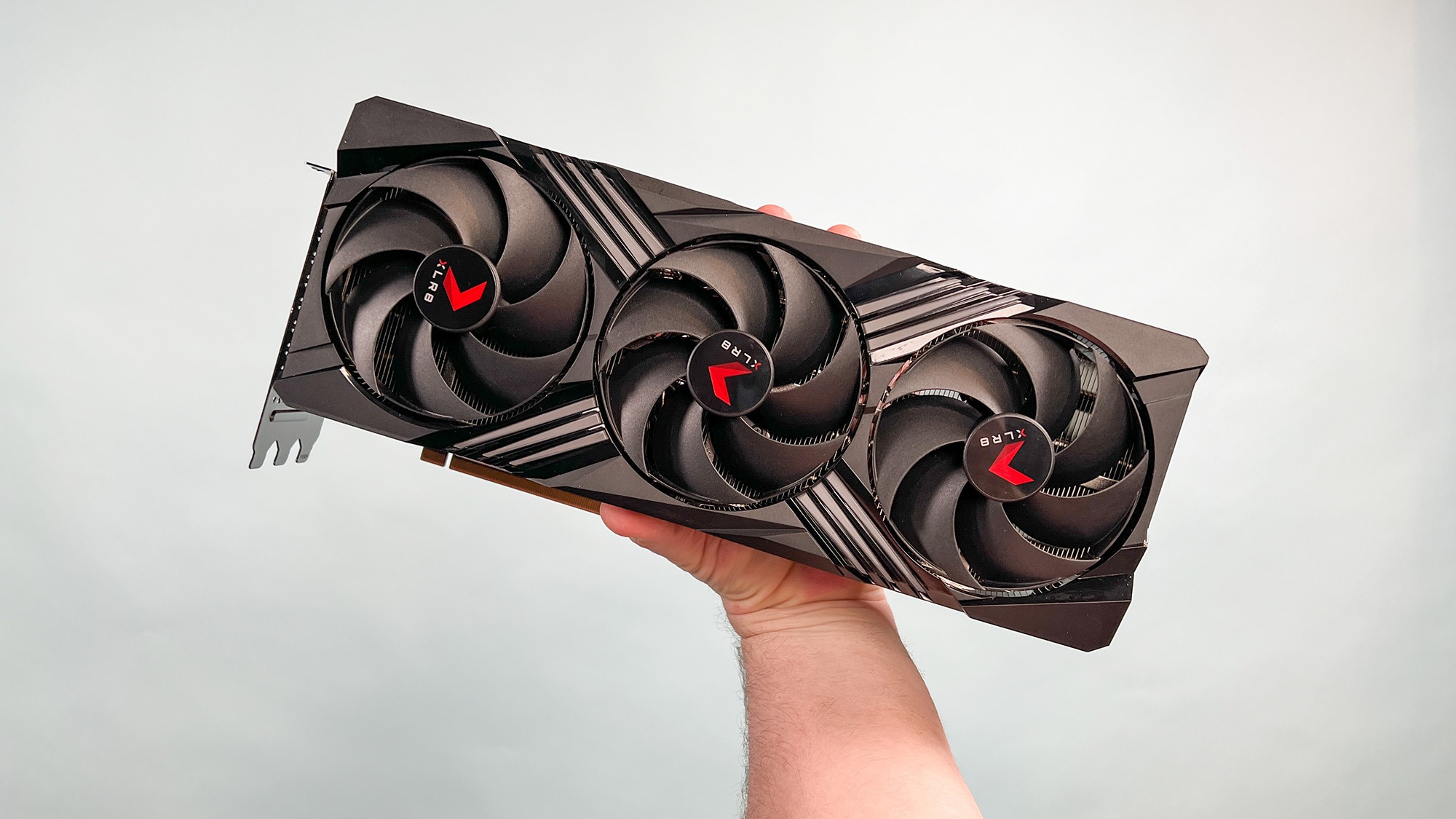
| Value | While coming in cheaper than the base RTX 4080, it's still too expensive. | 2.5 / 5 |
| Design | There are some extra customization options that are a good value add, but the card is also longer and thicker, making case and cable management a challenge. | 3.5 / 5 |
| Features | The OC version of this card gives you some flexibility to squeeze some better performance, while the RGB will make it match your other RGB components much better. | 3.5 / 5 |
| Average rating | Row 3 - Cell 1 | 3.2 / 5 |
Buy it if...
You can't afford the RTX 4090
If the RTX 4090 is out of reach (an understandable concern, for sure), then this is the next best Nvidia graphics card in terms of raw performance.
You want an overclocked card
The Nvidia RTX 4080 Founders Edition can't be overclocked, but you have some wiggle room with the PNY RTX 4080 XLR8 OC to boost some performance with some settings tweaks.
Don't buy it if...
You can afford the RTX 4090
I really can't stress enough that the RTX 4090 should be the graphics card to buy if you can afford to get it. It's the best there is, and there's no reason to settle for second best at this price point.
You want the best gaming graphics card overall
While the RTX 4090 is in a class of its own, the RX 7900 XTX is the better graphics card for gaming overall, especially given its much lower price.
PNY GeForce RTX 4080 XLR8: Also consider
| Header Cell - Column 0 | PNY GeForce RTX 4080 XLR8 | Nvidia GeForce RTX 4090 | AMD Radeon RX 7900 XTX |
|---|---|---|---|
| Price (MSRP) | $1,189 (about £950 / AU$1,725) | $1,599 (about £1,359, AU$2,300) | $999.99 / £899 / AU$1,789 |
| Shader Count | 9,728 | 16,384 | 6,144 |
| Base Clock | 2,205 MHz | 2,235 MHz | 1,855 MHz |
| Boost Clock | 2,550 MHz | 2,520 MHz | 2,499 MHz |
| Memory | 16GB GDDR6X | 24GB GDDR6X | 24GB GDDR6 |
| Memory Speed | 23 Gbps | 21 Gbps | 20 Gbps |
| Output | 3 x DisplayPort 1.4a, 1 x HDMI 2.1 | 3 x DisplayPort 1.4a, 1 x HDMI 2.1 | 1 x HDMI 2.1a, 2 x DisplayPort 2.1, 1 x USB Type-C |
Nvidia GeForce RTX 4090
Without question, you will need to put down some serious money to get this card, but not that much more than you're paying for the PNY RTX 4080 XLR8 OC, so you might as well go with the best there is.
Read the full Nvidia GeForce RTX 4090 review
AMD Radeon RX 7900 XTX
If you're looking for a premium graphics card for gaming, then the RX 7900 XTX will give you all the gaming performance you'll need at a much better price than the RTX 4080.
Read the full AMD Radeon RX 7900 XTX review
How I tested the PNY GeForce RTX 4080 XLR8
- I spent several weeks with the PNY GeForce RTX 4080 XLR8
- I used the PNY GeForce RTX 4080 XLR8 for gaming and content creation
- I tested it with our standard battery of benchmarks
In addition to running the standard battery of tests on this card, I also used it as my main GPU for work and gaming for several weeks. This included creative workflows like Photoshop and Lumion, as well as gaming on the most demanding titles like Cyberpunk 2077.
I have been reviewing computer hardware for several years now, and have an extensive computer science background to make sense of the data I'm collecting.
We pride ourselves on our independence and our rigorous review-testing process, offering up long-term attention to the products we review and making sure our reviews are updated and maintained - regardless of when a device was released, if you can still buy it, it's on our radar.
First reviewed May 2023

John (He/Him) is the Components Editor here at TechRadar and he is also a programmer, gamer, activist, and Brooklyn College alum currently living in Brooklyn, NY.
Named by the CTA as a CES 2020 Media Trailblazer for his science and technology reporting, John specializes in all areas of computer science, including industry news, hardware reviews, PC gaming, as well as general science writing and the social impact of the tech industry.
You can find him online on Bluesky @johnloeffler.bsky.social
